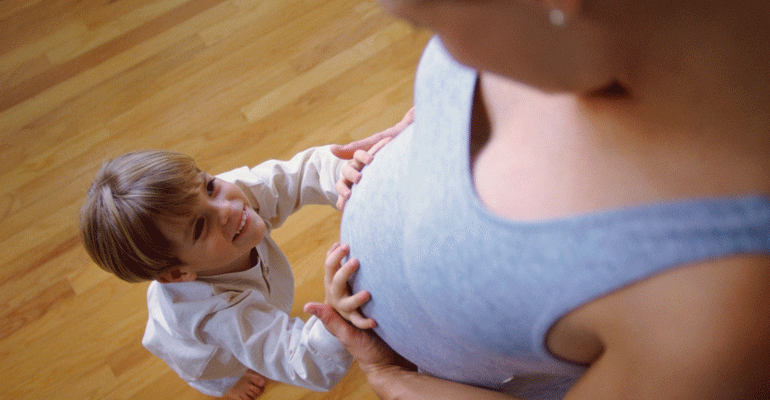At the core of each birth parent’s adoption decision is love, as well as a commitment to secure the best possible future for a child. But another important component of the decision is context. Circumstances change, perspective is established. Someone who makes a hard decision today might make a different decision 10 years, five years, or even one year from now.
“This time, I’m going to keep it”
Our youngest son’s birth mother was a teenager when she learned she was pregnant with him. She made an adoption plan based on where she was–literally and figuratively–at that point in her young life.
Our open adoption plan is very specific. It calls for four two-hour visits per year. We meet in a public place–usually, a nearby mall—and, despite some growing pains, our relationship has evolved. Our visits are comfortable, and they occasionally include some of her friends and family. They are always focused on the sweet boy who will forever link us.
What we didn’t contemplate as we were drawing up the plan was the fact that our son’s birth mother was herself going to grow up, that she would go on to new relationships and might choose to make children a part of her future. And that is precisely what has happened. As I write this, August’s birth mother is six months pregnant and knows she is having a boy.
We’ve had time to adjust to the idea. She became pregnant the year before, and revealed her news during one of our visits to the mall. “I’m pregnant again. Due in April. And this time I’m going to keep it.” That announcement had come as a shock. I remember looking down at my 13-month-old in his stroller, thinking, “How am I going to explain this to you? How am I going to help you understand that, just one year after making an adoption plan for you, your birth mother is choosing to parent?” Tragically, that pregnancy ended in a miscarriage.
This time, as she shared the news, she was nervous, but optimistic about the future. We feel the same mix of emotions as we anticipate the changes ahead. August, who just turned three, is the youngest in our family, but he will soon be the oldest in his birth family. Our plan with August’s birth mother is that she will bring the baby to every visit. August’s biological brother will be a part of our lives, of his life. He will see the baby at our visits, he will bond with him, and he will ask about him between visits.
Other Brothers and Sisters
Our two older boys have biological siblings, but none of them are being raised by their birth parents. Our oldest, Oscar, was the seventh child of his birth mother, but the only one for whom she actively made an adoption plan. The one time we met, she explained to us that she refused to allow social services to make any more decisions for her, and that she was going to do it her way with this baby. Oscar knows that his birth mother attempted to parent her first six children; and today, at eight years old, he understands that he’s fortunate that she made a different decision for him. He sees his birth mother as brave, as one who learned from experience what she could and could not do.
Our middle child, Edgar, who’s seven, was the second child of his birth parents–a married couple who, due to extreme financial hardship, made adoption plans for both of their children. However, because that adoption is closed, we do not know whether this couple stayed together and went on to have other children. In seven years, of course, anything could happen. As our son gets older and asks questions, we will speculate together.
We were able to stay in touch with Edgar’s birth sister, however, and we see her adoptive family once or twice a year. Our son knows he “grew in the same uterus” as his biological sister, but if you ask him who his siblings are, he will name only his brothers. Edgar and his birth sister refer to each other by their first names, not as “brother” and “sister.”
A New Reality
August’s birth mother refers to her second baby as our son’s brother, and indeed he is–biologically. How our son will see him, ultimately, will be for him to determine. Something tells me that his two brothers will help to shape his perceptions.
Though August is a little young to understand much about the expected baby, we have started the conversation with Oscar and Edgar. They understand that their brother has a birth sibling on the way and that he will meet him at a visit very soon. They both understand that they, too, have birth siblings, whom they will only meet years hence–if ever. They are learning that there are as many family stories and particular variations as there are people. They are learning from a very young age that nothing in our world is black and white.
One night not long ago, as I tucked Oscar into bed, I talked with him about the baby. I asked him what he thought, and what he thinks his youngest brother might one day think. Oscar said, very earnestly, “I think he’ll think he’s lucky that his birth mother made the decision she did for him.”
And then I knew that, no matter the challenges we’ll face as parents, if we meet them head-on and talk about them with openness and love, it’s all going to be fine.

